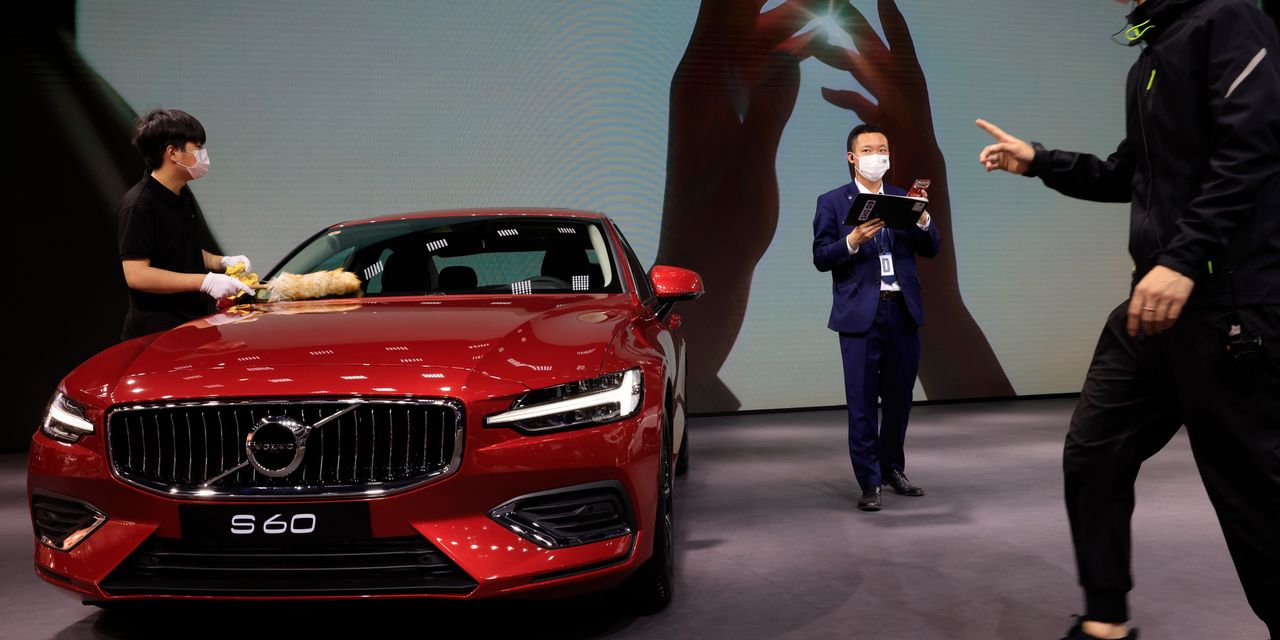The mooted initial public offering of Volvo Cars is a must-watch test case of investor appetite for smaller car manufacturers as the industry’s technological transition accelerates.
The privately held Swedish company, which reported half-year results on Friday and isn’t to be confused with listed truck giant
Volvo
VOLV.B 1.53%
AB, said in May that it was working toward an IPO later this year. If Geely Holding, the Chinese company that bought Volvo from Ford in 2010 for just $1.8 billion, gets the deal away at a healthy valuation, it will be a victory for strategic flexibility over sheer industrial and financial might.
The Swedish company is smaller than its traditional rivals. It sold 773,000 vehicles over the 12 months through June, which compares with about 2.2 million
Mercedes-Benz
cars, for example. The German brand said Thursday it would spend at least €40 billion, equivalent to roughly $47 billion, on electric vehicles through 2030, the latest in a lengthening list of similar pledges. Volvo can’t hope to compete in this game and has been silent on the question of its total EV investments.
Yet the company was earlier than most to embrace the shift to EVs, and its transition strategy is still among the most forward-thinking in the industry.
For example, it will take the unusual step of selling its latest all-electric car, the Volvo C40 Recharge, only through its website, Tesla-style, rather than through dealerships. In the U.S., where franchise laws mostly prohibit direct car sales by manufacturers, it has reinvented the purchase process so that dealerships only own the vehicle for a split second. This will give Volvo more control over inventory, pricing and customer data. The last point is particularly important as cars become connected digital devices through which add-on services such as insurance might be sold.
Volvo also seems to be ahead of peers in making the most of both the problematic assets and the jewels in its portfolio. This month it agreed to pool its engine factories and other legacy assets with those of Geely to create a quasi independent supplier called Aurobay, of which it will own 33%. Meanwhile, the Polestar EV brand, in which Volvo owns a big stake, is in talks with U.S. special-purpose acquisition company Gores Guggenheim to go public, according to a recent Bloomberg report.
Questions about Volvo’s limited scale will linger after Friday’s results. The 9.4% first-half operating margin marked a record under the current ownership, but was flattered by one-time effects, notably a gain on the Polestar holding triggered by a fundraising. The margin was roughly 7.1% on a recurring basis, which compares with 12.8% for Mercedes-Benz cars and vans in the second quarter.
Geely Holding previously tried to merge Volvo with Hong Kong listed Geely Auto, in which the holding company owns a majority stake, but called off the deal in February in favor of the Aurobay plan and other joint projects. Part of the problem seems to have been pinning a value on Volvo that would satisfy both Geely Holding’s billionaire founder
Li Shufu
and minority Geely Auto shareholders. A Volvo IPO would clarify the valuation question, potentially paving the way for further talks if synergies from the companies’ deepening partnership underwhelm.
But first Volvo has to persuade investors that clear thinking and a clean portfolio matters more than just how many billions of dollars it has to spend on next-generation products. It has a fighting chance.
Write to Stephen Wilmot at stephen.wilmot@wsj.com
Copyright ©2021 Dow Jones & Company, Inc. All Rights Reserved. 87990cbe856818d5eddac44c7b1cdeb8













































